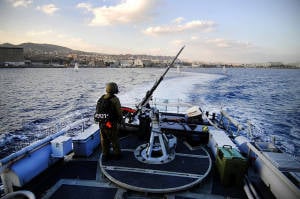Hamas reportedly offered Israel a five-year truce in exchange for an end to the blockade on Gaza. Is the terror group caving in to pressure?

The navy patrols Israel’s shores. (Photo: IDF)
Documents revealed by Times of Israel (TOI) indicate that the Gaza-based Hamas terror group offered Israel a long-term armistice in exchange for a lifting of the blockade it had imposed on the Gaza Strip.
Senior Hamas officials reportedly met with Western diplomats and have reached a number of understandings regarding the details and length of a potential ceasefire, also known as a tahadiyya – a long-term period of calm, but not a permanent peace agreement.
Hamas offered a cessation of hostilities for at least five years, during which all military activities “above and below ground” from both parties would end.
The Western diplomats involved included Robert Serry, the UN’s outgoing Special Coordinator for the Middle East Peace Process, and Swiss Consul Paul Garnier, the key figure in maintaining contacts with Hamas, TOI reports.
An Israeli official reportedly confirmed to TOI that the offer was presented. However, a Hamas official said that there was no Israeli reaction and that he expects to get a response after the elections.
Israel imposed full nautical and land closure on the Gaza Strip after Hamas violently took control of Gaza in 2007. Israeli security forces have since been working to thwart Hamas’ armament and the building of its terror infrastructure.
Hamas Working to Alleviate the Pressure?
Hamas has been under a great deal of pressure from multiple directions in recent months.
After accusing the terror organization of involvement in the smuggling of weapons through underground tunnels into the Sinai Peninsula and of actively attacking Egyptian military targets, an Egyptian court outlawed Hamas completely in March. This court decision could harm Hamas financially and hinder its diplomatic efforts.

Hamas inspects their headquarters destroyed by the IDF during Operation Protective Edge. (Photo: Abed Rahim Khatib/Flash90)
The Egyptian army also launched a broad campaign to destroy the Hamas smuggling tunnels and to create a buffer zone between Egypt and Gaza. In the process, it destroyed hundreds of Palestinian homes in Gaza.
This has seriously hindered Hamas’ rearmament efforts and effectively cut it off from the munitions supply line from Iran, forcing it to resort to other smuggling venues.
As part of the regional realignment and the Arab countries’ stepped-up campaign against terror, Qatar, one of Hamas’ primary benefactors, purportedly cut Hamas off and banished its leader, Khaled Mashal, from the country, forcing him to seek refuge in Turkey.
Tensions between Hamas and Fatah, the Palestinian Authority’s ruling party, have been running high ever since the establishment of a unity government last spring. Both sides have made mutual accusations of corruption, graft and treason.
The rehabilitation of the Gaza Strip has been progressing at a slow pace, generating civil unrest and further interfactional violence and rivalry. Many countries that had pledged to donate towards rebuilding Gaza have not followed through.
Finally, Hamas was dealt a severe blow by the IDF in the summer during Operation Protective Edge. The IDF announced that it had destroyed as much as 80 percent of Hamas’ rocket stockpiles, and many of its operatives were killed in combat.
Update: Sami Abu Zuhri, a spokesman for the group, has denied that Hamas requested a truce, according to TOI.
By: Aryeh Savir
Staff Writer, United with Israel